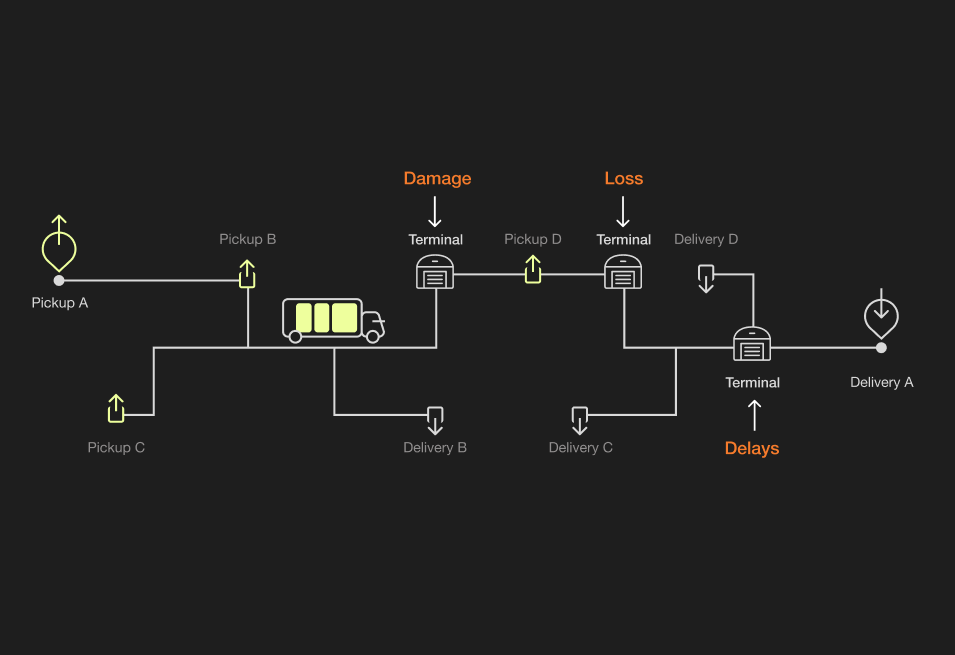What is Blind Shipping?

Sometimes it’s helpful to keep people in the dark. Many businesses rely on keeping the identity of suppliers a secret, ensuring that both customers and competitors don’t overstep the business and go straight to the supplier. Thankfully, there is a method of shipping that allows businesses to do exactly that — it’s called blind shipping, and countless companies have taken advantage of this method to ensure that their business remains financially safe.In almost all cases, blind shipments are made at the request of distributors. Imagine that you’re a business operating out of Atlanta. You’ve scoured the world for a great supplier of rare material, and you’ve finally tracked one down after a long and costly search. Wouldn’t you take whatever steps you could to ensure that that supplier remains hidden from your competitors and customers?Businesses that don’t take the step of maintaining the anonymity of their suppliers run the risk of being cut out of the buyer-seller equation. Of course, this doesn’t apply to all companies – some don’t have to worry about keeping the identity of their suppliers a secret because they possess other advantages that ensure their relevancy. However, if you’re a company that attracts business because of your ability to provide certain goods that customers can’t find elsewhere, it’s in your best interest to protect that advantage.
Benefits of blind shipping
For certain businesses blind shipping is invaluable. It’s impossible to put a price on the ability of a company to maintain its supply chain without releasing that information to competitors. More than anything, blind shipping is a supply chain management technique.
Management Technique
In many cases, blind shipping is used as an integral tool in the process of drop shipping. We’ll explain in more detail what drop shipping is and how blind shipping plays a role in the process, but for now, we’ll explain its use in supply chain management.
- Many businesses don’t have a warehouse where they keep products on hand. Instead, they function as an intermediary between customer and supplier. Many online businesses use this technique, but it’s also fairly common for companies who operate from a physical location.
- By maintaining tight control over the chain of supply, businesses can keep their futures secure and don’t run the risk of becoming irrelevant.
Protect competitive advantage
Companies are always trying to figure out what their competitors are up to. There’s a whole economy built around trying to figure out what other businesses are doing and where their information is coming from. This is because information is king. It sounds like a cliché, but it couldn’t be further from the truth.If you’re a company that knows where to get the best ingredient for a certain product, all of your competing companies will be on the hunt for that same good. Protecting that advantage is vital and essential if you want your business to survive. Taking steps to ensure that you keep that advantage almost always includes blind shipping.
Protect your supplier
In some cases, suppliers don’t want their information handed out. There are many reasons this could be. Sometimes companies and suppliers have exclusivity deals which would be jeopardized if the identity of the supplier was divulged to prying eyes. Shipping blind eliminates this as a possibility.
How competitors find your supplier
If you’re a company, it’s likely that you’re keeping tabs on your competitors. It’s also safe to say that your competitors are keeping tabs on you. The reasons to do this are plentiful.
- If a business sees that something their competitor is doing is attracting customers, they’re almost certain to adopt the same tactic.
- It’s important for companies to stay on top of market trends. If they don’t, they run the risk of becoming irrelevant.
Some companies are fantastic at legally spying on their competition, and there are some simple ways it can be done. This post is not meant to offer a guide to competitive spying, but it’s important to be aware of the simple ways businesses conduct these operations so that you can better protect your own company. Blind shipping plays an integral role in this protection strategy.
Consulting companies
There are entire businesses dedicated to analyzing the competition. Imagine that you run a company that is flagging in yearly sales. Your competitor across town is flourishing, and you can’t seem to figure out why there’s such a large discrepancy between your successes. In this case, the struggling company might contract the services of a consulting firm to run a deep analysis of the opposing company. The end goal would be to adopt their successful tactics and integrate them into their business strategy.
Paid online tools
If companies don’t necessarily want to pay for a consulting firm – an expensive investment in many cases – to run a surveillance campaign against competitors, they also have the option of using a paid online tool. There are some online companies that provide this same service for a smaller fee. Their results are more limited than the deep search provided by consulting firms, but often the resulting information is sufficient to make the necessary adjustments to strategy.
Analyzing a bill of lading
Whenever anything is shipped – be it by ground, air, or sea – there is a document that includes all of the relevant information to the shipment. This document is called a bill of lading. It’s essentially the receipt that goes along with any shipment. Included on the bill of lading is supplier information, importer information, product information, and a running record of the various destinations that the shipment has reached on the way to its endpoint.In some countries, the bill of lading is considered a private document. The only people that have access to it is the person receiving the shipment – so that they can verify that their goods have been sent through the appropriate channels – and the supplier. However, there are many countries that make the bill of lading easily accessible to anyone. When goods pass through these locations, it’s possible for competitors to access the bill of lading and figure out where the goods were originally shipped from, thus disclosing the identity of the supplier.It seems like a sneaky and perhaps unlawful method of information acquisition, but it’s not. It’s common practice for most companies and it’s expected that their competitors will be attempting to intercept these documents. That’s where blind shipping comes in. When you ship blind, the supplier information on the bill of lading is concealed. The consignee—the person receiving the shipment—won’t be able to access the information. When they look at the document, your company name will appear in lieu of the suppliers.
Double-blind shipments
By now, it should be clear how blind shipments work. The identity of a supplier or shipper is concealed from the receiving party. Simple enough. However, there are cases where the distributor—the business or middleman conducting the transaction—is best served by making sure that both parties, the supplier as well as the recipient, are kept in the dark about their identities.In order to ensure that these parties remain unaware of one another, distributors can opt for an option called double-blind shipping. When a distributor selects this option, the supplier and the shipper both send and receive anonymously.
Why ship double-blind?
There are several reasons to ship double-blind. While many companies are worried about fending off the prying eyes of their competitors, sometimes there are threats that exist within the supply chain. It’s not unheard of that a supplier, having discovered the identity of the recipient after shipping goods to their address, chooses to reach out directly and establish a direct line of communication. In these cases, the business that facilitated the deal can be cut out of the process entirely.While this may seem like shady business practices, it’s actually surprisingly common. When a supplier has to route their business through an intermediary business, they might end up making less money than they otherwise could if they were directly connected to customers. For this reason, it can be in the best interest of a business facilitating these transactions to make sure that the supplier and consignee are unaware of the other’s identity.
Dropshipping
When people discuss the idea of blind shipping, it’s usually within the context of dropshipping. Understanding how dropshipping works is an essential puzzle piece when trying to understand why blind shipping is so popular.The standard retail model is that a company will carry inventory, and then customers will buy that inventory directly from the company. Dropshipping is a variation of this model that allows the company to keep nothing in stock and still supply customers with the goods that they advertise. While the concept may seem complicated, it’s in fact very simple once you understand a few core ideas.
Dropshipping and the internet
The vast majority of companies that use dropshipping as a strategy are online businesses. After deciding what product they want to sell, companies reach out to suppliers of that product. They attempt to buy the product for cheap, at wholesale prices and then resell them to customers through their own website at a higher price. They make money in the difference.Without the internet, dropshipping would only be a minor footnote in the history of consumer culture. However, because there are so many lines of communication available to businesses that allow them to reach out to various suppliers and customers, it’s become a phenomenon that many companies have been able to cash out on.
Benefits of drop shipping
There are several benefits to dropshipping. Many companies have discovered that its advantages make it a better system than owning a traditional brick-and-mortar store.
Less capital
This is perhaps the biggest allure. When many companies start out, they find that they have to spend thousands and thousands of dollars on setting up their store, buying products, and keeping inventory stocked up. Dropshipping eliminates this financial burden.
- Businesses don’t have to purchase products until the customer has already agreed to the sale.
- Dropshipping allows businesses to begin operations with very little money.
Eliminate overhead
Many drop shipping businesses are conducted from the privacy of a person’s home. They don’t have to pay for a warehouse or rent out an office. The entire company can exist on the internet, and the acquisition of a product can be made from a personal computer.
Easy to start
Compared to traditional brick-and-mortar stores, dropshipping business is easy to start. There are several hurdles that are totally eliminated when companies choose to operate using this model.
- Companies never have to worry about running or operating a warehouse.
- Companies never have to worry about tracking inventory, because the shipment is sent directly from the supplier to the customer.
- Companies are able to quickly adjust their stock based on market trends – if a product suddenly goes out of style, dropshipping companies aren’t stuck sitting around with a bunch of unusable goods.
Dropshipping and blind shipping
In many cases, dropshipping wouldn’t be a sustainable business model without blind shipping. When the two are paired, customers aren’t able to discover the business supplier and in doing so eliminate the middleman. It’s essential for the companies who are selling these goods to maintain a level of secrecy.As we’ve discussed, there are several benefits to blind shipping that make it the ideal shipping strategy for businesses that want to protect the identity of their supplier. With so much market competition in virtually every single sector, any advantage a business can adopt to give themselves an edge should be considered. In some cases, the difference between blind shipping and regular shipping is the difference between a thriving company and one that’s destined to fail.Give your business a competitive advantage with our shared truckload solution.





